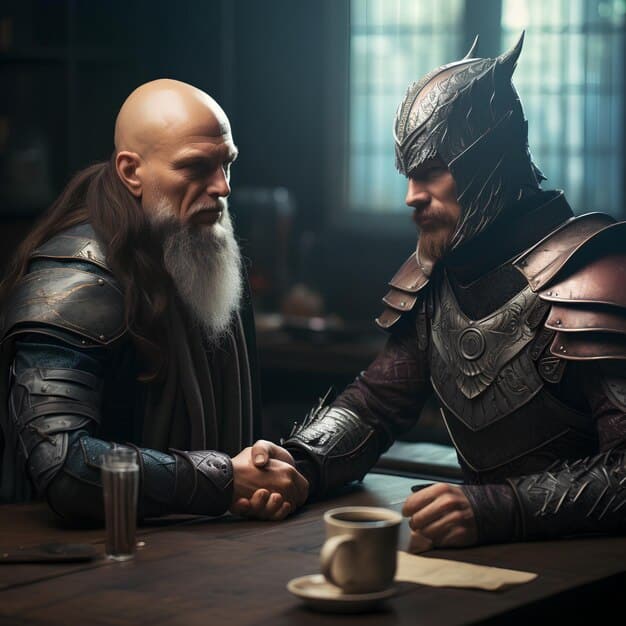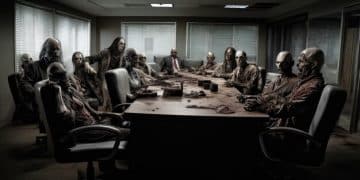Unveiling the Political Chessboard in Netflix’s The Witcher

Netflix’s ‘The Witcher’ masterfully intertwines monster hunting with complex political maneuvering in the Northern Kingdoms, exploring power struggles, alliances, and betrayals that shape the destiny of characters like Geralt, Yennefer, and Ciri amidst a backdrop of war and prejudice.
Dive into the intricate web of political intrigue and power struggles that define the Northern Kingdoms in Netflix’s ‘The Witcher’. From scheming monarchs to powerful sorceresses, the series unveils a world where alliances are fragile and betrayal lurks around every corner.
The Shifting Sands of Power in The Witcher
The world of “The Witcher,” brought to life by Netflix, is far more than just a stage for battling monsters. It’s a complex tapestry woven with political threads, where power struggles among the Northern Kingdoms dictate the fate of individuals and the continent as a whole. The series masterfully portrays these intricate relationships.
Monarchs and Their Ambitions
At the heart of the Northern Kingdoms lie its rulers, each driven by their own ambitions and desires. Their decisions, often fueled by self-interest, can have far-reaching consequences.
The Role of Magic and Sorceresses
Magic users, particularly the sorceresses of Aretuza, wield significant influence in the political landscape. Their knowledge, power, and strategic alliances make them valuable players in the game of thrones.
- Examine the influence of King Foltest of Temeria and his struggles to maintain power
- Understand how Queen Calanthe of Cintra’s fierce independence shapes her kingdom’s destiny
- Analyze the role of the Brotherhood of Sorcerers and their impact on political decisions
The pursuit of power in the Northern Kingdoms is a relentless game, where alliances are constantly tested, and betrayal is a common weapon. The political landscape is ever-changing, driven by the ambitions of monarchs, the influence of magic, and the constant threat of war.

Nilfgaard’s Shadow: An Empire’s Expansion
Beyond the squabbles of the Northern Kingdoms lies a looming threat: the Nilfgaardian Empire. Its relentless expansion and hunger for conquest cast a long shadow over the continent, disrupting the existing power balance.
The Might of the Nilfgaardian Army
Nilfgaard’s military strength is a force to be reckoned with. Its disciplined legions and strategic prowess make it a formidable enemy for the fractured Northern Kingdoms.
The Emperor’s Vision
Emperor Emhyr var Emreis’s motives are shrouded in mystery. Is he a conqueror driven by greed, or does he have a more complex agenda for the continent?
- Explore the political strategies employed by Nilfgaard to destabilize the Northern Kingdoms
- Analyze the impact of Nilfgaardian culture and ideology on conquered territories
- Discuss the moral implications of Nilfgaard’s expansionist policies
The Nilfgaardian Empire’s presence serves as a catalyst for conflict, forcing the Northern Kingdoms to confront their own weaknesses and consider forming alliances to resist the encroaching darkness. The fear of Nilfgaard is a potent force in the political landscape.
The Elusive Neutrality of Witchers
In a world consumed by political machinations, witchers like Geralt of Rivia strive to maintain neutrality. However, their involvement in monster hunting often brings them face-to-face with the consequences of political decisions.
Witchers operate on the fringes of society, bound by a code of neutrality. They are monster hunters for hire, offering their services to those in need, regardless of political affiliation.
Despite their attempts to remain detached, witchers are frequently drawn into political conflicts. Their unique skills and knowledge make them valuable assets, and their decisions can inadvertently influence the balance of power.

The witchers’ neutrality is constantly tested as they navigate the treacherous political landscape. Their actions, even when driven by a desire to remain impartial, can have profound political ramifications, highlighting the difficulty of staying uninvolved in a world defined by power struggles.
The Brotherhood of Sorcerers and Aretuza
The Brotherhood of Sorcerers and the prestigious school of Aretuza represent a powerful political force. They train mages who often become advisors, strategists, and even key players in royal courts.
- Discuss the power dynamics within Aretuza and the competition for influence.
- Analyze the ethical considerations faced by mages who choose to serve monarchs.
- Discuss the changing role of magic and mages in society after key events in the series
The Allure of Power
For many sorceresses, the allure of power is irresistible. They seek to influence political decisions and shape the world according to their own vision.
The Price of Ambition
However, the pursuit of power comes at a price. Sorceresses face constant scrutiny, political maneuvering, and the risk of betrayal.
The Brotherhood and Aretuza are not merely institutions of magical learning; they are centers of political power, where ambition, alliances, and betrayals shape the destiny of individuals and the course of kingdoms.
Fringilla Vigo and Nilfgaardian Magic
Fringilla Vigo, a Nilfgaardian sorceress, stands as a significant figure in the political and magical landscape of “The Witcher.” Her allegiance to Nilfgaard and her mastery of dark magic set her apart.
- Explore Fringilla’s motivations and her role in Nilfgaardian expansion.
- Analyze the differences between Nilfgaardian magic and the magic practiced in the North.
- Speculate on Fringilla’s future and her potential impact on the political landscape.
Fringilla Vigo embodies the cunning and ruthlessness that define Nilfgaardian politics. Her actions are driven by a fierce loyalty to her empire and a willingness to employ any means necessary to achieve its goals.
Ciri: A Pawn or a Player in the Game?
Ciri, the Lion Cub of Cintra, is more than just a princess. Her Elder Blood and destiny make her a key player in the political game, desired by many and understood by few.
- Analyze the prophecies surrounding Ciri and their impact on political decisions.
- Discuss the moral dilemmas faced by those who seek to control Ciri.
- Discuss Ciri’s journey into learning more about her powers
The Value of Destiny
Ciri’s destiny is seen as a powerful tool by various factions. They believe that controlling her is tantamount to controlling the future.
The Burden of Power
However, Ciri is not merely a pawn. She possesses a will of her own and the potential to shape her own destiny, defying the expectations of those who seek to control her.
Ciri’s existence throws the established political order into disarray, making her a central figure in the power struggles that define “The Witcher.” Her choices will determine not only her own fate but also the fate of the Northern Kingdoms.
| Key Element | Brief Description |
|---|---|
| 👑 Monarchs | Rulers of the Northern Kingdoms vying for power. |
| ⚔️ Nilfgaard | Expanding empire threatening the Northern Kingdoms. |
| 🧙 Sorceresses | Magic users influencing politics through alliances and power. |
| 🐺 Witchers | Neutral monster hunters drawn into political conflicts. |
Frequently Asked Questions
▼
The Northern Kingdoms are a collection of independent realms in “The Witcher,” each with its own ruler, culture, and ambitions, constantly vying for power and influence over the Continent.
▼
Emperor Emhyr var Emreis is the ruler of the Nilfgaardian Empire, known for his strategic mind and military might, who seeks to expand his empire and secure his legacy through conquest and political maneuvering.
▼
Witchers adhere to a strict code of neutrality, taking contracts based on need rather than political alignment. They aim to remain detached from political squabbles, though they’re invariably drawn into them.
▼
Fringilla Vigo is a powerful Nilfgaardian sorceress who serves as a key strategist and commander in the Nilfgaardian army, known for her mastery of dark magic and unwavering loyalty to the Empire.
▼
Ciri is crucial due to her Elder Blood and the prophecies surrounding her, making her a target for various factions who believe controlling her equates to controlling the future and manipulating events.
Conclusion
Netflix’s ‘The Witcher’ presents a compelling narrative that extends far beyond monster hunting. It delves into the complexities of political intrigue, showcasing the constant struggle for power among the Northern Kingdoms, the looming threat of Nilfgaard, and the personal battles faced by individuals caught in the crossfire. The series invites viewers to consider the ethical implications of ambition, the price of power, and the enduring quest for a just world.





